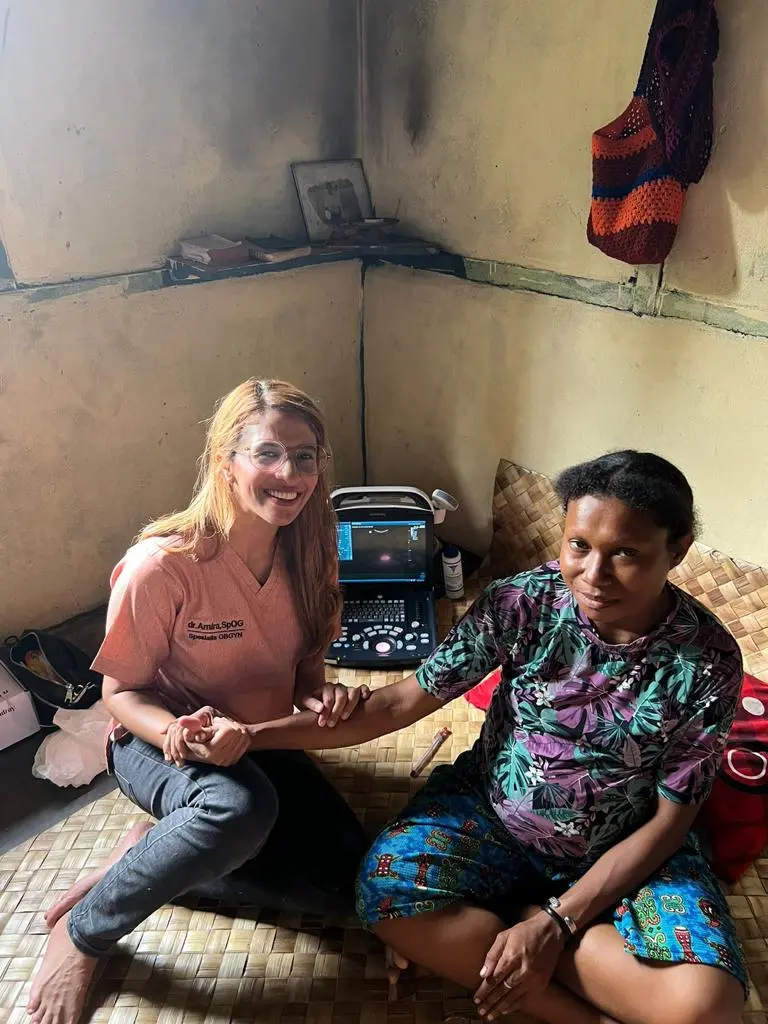UNAIR NEWS – Dr. Amira Abdat, SpOG, a graduate of the Faculty of Medicine, Universitas Airlangga (UNAIR) in 2020, is now dedicated self as the only Obstetrics and Gynecology specialist in Fakfak, West Papua. She frequently shares educational content on reproductive health and pregnancy through her social media.
Amira’s education journey
The owner of the Instagram account @amira.abdat19 received a scholarship from the Ministry of Health of the Republic of Indonesia (Kemenkes RI) in 2015 to pursue her specialist education at UNAIR. She completed her undergraduate studies in Medicine at Trisakti University in 2012. From 2013 to 2015, she worked as a general practitioner and was assigned to a remote health center in FakFak.
“I observed no resident Obstetric and Gynecology specialists stayed there. Given the urgency of the situation, I felt that I did not have enough knowledge to replace them. Therefore, I enroll on a specialist program at UNAIR from 2015 to 2020. After completing my education, I returned to serve in Fakfak, Papua,” she explained.
Motivation to return to Papua
As an Obstetrics and Gynecology specialist, she reported that there are 95,000 inhabitants in Fakfak, 50% being women with difficulty accessing pregnancy examinations, the prevalence of sexual violence, and the increase in Maternal Mortality Rate (MMR) and Infant Mortality Rate (IMR).
“In addition to medical treatment, our presence is also aimed at providing education on pre-marital sex. Based on the prevailing phenomenon, many women get married after becoming pregnant with their third child. Even that is considered normal and socially accepted. Despite the lack of entertainment, they engage in sexual activities without proper knowledge,” she explained.
This situation is exacerbated by the population’s preference for traditional healers (shaman) over healthcare facilities. The long travel distance from villages to the city, which takes hours, contributes to this preference. Many people do not possess identification documents such as birth certificates, family cards, or other administrative documents.
“Let alone the National Health Insurance (BPJS), they don’t even have birth certificate, family card, and other administrative documents. They tend to lack these documents,” said the UNAIR alumna.
Regarding the healthcare facilities in West Papua, she mentioned that Fakfak Regional General Hospital (RSUD Fakfak) is a Type C hospital equipped with standard-accredited medical equipment and has four basic doctors, including surgeons, internists, obstetricians, and pediatricians. Amira believes that although the facilities are not perfect, they are relatively comprehensive.
Challenges
This situation gradually changed with the establishment of the “Gerakan Jemput Bola” (Home Visits) initiative, which Amira and her team initiated to serve patients in remote areas with difficult access to health centers. They spend 4-6 hours on a boat, braving strong winds, waves, and heavy rain, while carrying fuel for the ultrasound machine due to the lack of electricity.
She emphasized that childbirth involves two lives, so they come to support the traditional birth shaman, community health workers, and pregnant women as their family. Before attending to patients, they establish an emotional connection with the traditional birth shaman. They provide forceps, underpads, and other sterile birth equipment.
“While we don’t encourage home births, in emergency situations, the traditional birth shaman can handle it. Additionally, we have a team member from the health office who assists with administrative tasks, including the National Health Insurance (BPJS). So, we make the most of the situation,” she said.
As time goes by, the door-to-door and heart-to-heart services have yielded results. Unsurprisingly, 60 percent of the Maternal and Child Mortality Rate (MCMR) has been resolved, and even the traditional birth shamans have been educated. As an expression of gratitude, many patients who gave birth have named their children Amira.
Amira’s message
This UNAIR alumna refers to the “Gerakan Jemput Bola” (Home Visits) initiative as an adopted program from her UNAIR mentors. She vividly remembers the message from her great teacher. “Wherever you go, Airlangga is on your shoulders. Airlangga teaches you to work sincerely and selflessly without thinking about material gains. Rest assured; blessings will come.”
“Although I am alone here, I never feel alone because my teachers at UNAIR often provide updates and offer assistance. So, never give up in any situation. In the darkest of paths, there will always be light at the end, which is your own inner light. It doesn’t have to be perfect; it’s enough to be useful to others,” she conveyed.
She also sent a message to healthcare professionals and policymakers in big cities to embrace remote areas, whether in Papua, West Papua, or other regions that still need healthcare professionals. “The stigma of conflict surrounding Papua will break if they are here, as communication is the key,” she concluded.
Author: Viradyah Lulut Santosa
Editor: Khefti al Mawalia









